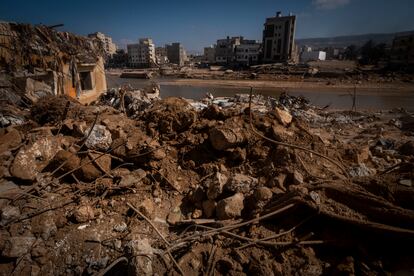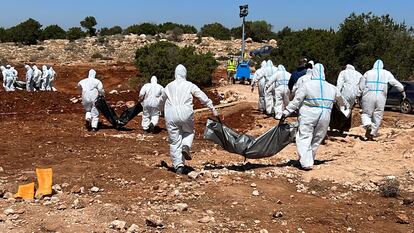Coordinator of Derna morgue: ‘We need psychologists to deal with this trauma’
Medical material and humanitarian aid has begun to arrive in Libya, where the total number of dead and missing after the floods has risen to 20,000

Dr. Anas Bargheti, coordinator of the city morgue in Derna, has been working in terrible conditions since early Monday morning. “We have had a few very difficult days, surrounded by many bodies, with no electricity, no refrigerators, no communications and a terrible smell,” the physician says. “It was a disaster. But now the situation is starting to improve.” For almost a week, Bargheti has overseen the arrival and storage of bodies recovered from under the rubble and on the seashore after Storm Daniel ripped through Libya, causing two poorly maintained dams outside Derna to burst and devastating a large part of the city. Last Thursday, in view of the risk of a cholera pandemic, the Ministry of Health decided that no more bodies would be kept in storage. As of then, when the remains of a victim are found, they are DNA tested and buried.
The floods have already claimed 20,000 victims, including the dead and the missing, according to the estimates of the authorities. “My greatest fear was that in the coming months we could suffer outbreaks of contagious diseases. But the arrival of international support with experience in this type of scenario has reassured us. We are receiving medical supplies and medicines from all the health centers in Libya and other countries. What we are lacking now are vaccines.” Bargheti doesn’t have a moment to waste. For a week now, he has barely slept for more than a few hours, as his red-tinged eyes testify. His biggest concern is the psychological impact of the humanitarian crisis on the survivors.
“During the first few days we saw that people were not crying. They were in shock, in a state of denial, including children. We need psychologists to help them deal with this trauma,” he says, before climbing into an ambulance and driving to the University Hospital, where those affected by the tragedy are also being treated.
At the entrance to the hospital, two young men on stretchers are being tended to. One of them suffered serious stomach injuries when part of a flood-damaged building collapsed. The other has a broken leg. “There are hardly any injured people coming in anymore. They were all treated. The biggest problem now is the psychological state of a population that has lost everything: relatives, neighbors, homes, jobs… everything. We know that mental health is always a lesser priority, but in this context, it is crucial,” says Dr. Arkham Omer Melkauri, coordinator of the humanitarian emergency response at the hospital.
The scenes in Derna confirm the fears held by Bargheti and Melkauri. Men like Faisal sit for hours next to what was once their home. “When the flood started, my wife and I went up, with my two-year-old daughter and our two-month-old baby, floor by floor to the fifth floor, where the roof is. From there, we saw how many of our neighbors were dying,” he says in a quiet voice.
“The buildings around us disappeared. We had close friends who lived in that house across the street. They all died. They were a family of seven.” Faisal spent two days searching for them among the rubble, until he eventually gave up. He imagines that, like hundreds of others, they were swept out to sea by the flooding. “They had a two-month-old baby. I can’t think of anything else but them,” says Faisal, who arrived in Libya 10 years ago as a refugee fleeing the war in Syria.
All around him, other men drag their feet, shod in flip-flops, caked with mud. They are looking for anything they can salvage from the ruins. Mohammed has managed to find a bag containing family documents. But he was more relieved to recover some toy perfume bottles belonging to his daughters. Until a week ago, he made a living driving a truck which, like almost everything else in the central district of the city, has also disappeared. Now he entrusts his future and that of his family to God.
Mohamed listens attentively to Abd Al Razeq, who has lost his father and his entire paternal family, with whom he lived. “My mother is with an acquaintance on the outskirts of Derna. And I spend my days wandering around here in case I can help someone. I sleep anywhere, wherever my friends and acquaintances invite me,” he says, adding a plea to the authorities: “We always knew that our city was built on the dam canal and that it was very dangerous. Now that it has to be rebuilt, I ask the engineers to pay attention to safety.” Looking around, it is hard to imagine that a catastrophe on such a scale could possibly be repeated.
In the adjacent street, a truck billows white smoke to disinfect the air and mask the smell of decay. The effect lasts only a few seconds. At the entrances to the city and at checkpoints, the military hand out masks and order passers-by to wear them.

International search efforts
On a street corner, young Red Cross volunteers lie on a mountain of sifted earth as newly arrived bulldozers remove debris blocking access to buildings. Rescue teams from several countries monitor the work of the machines in case new bodies are uncovered. After a week of hard work, Derna is no longer a mass grave.
Dozens of vehicles crisscross the city, carrying migrant men and women from sub-Saharan Africa employed for cleaning and garbage collection. At the roadside, exhausted men crowd together to receive food, clothes, blankets, and water from the humanitarian aid deliveries that are beginning to arrive in the city’s neighborhoods. There are hardly any women, and the few who come to these aid stations are unable or unwilling to talk. It is the men who accompany them who recount the tragedy.
On the coast, rescue teams are having more and more difficulty recovering the remains of the victims of this humanitarian catastrophe. Although military helicopters and drones are constantly scouring the coastline, the advanced state of decomposition of the bodies makes collection difficult and increases the risk of transmitting diseases. A week after Storm Daniel devastated Derna, the sea in the port city remains a dark brown, almost black, color.
Sign up for our weekly newsletter to get more English-language news coverage from EL PAÍS USA Edition
Tu suscripción se está usando en otro dispositivo
¿Quieres añadir otro usuario a tu suscripción?
Si continúas leyendo en este dispositivo, no se podrá leer en el otro.
FlechaTu suscripción se está usando en otro dispositivo y solo puedes acceder a EL PAÍS desde un dispositivo a la vez.
Si quieres compartir tu cuenta, cambia tu suscripción a la modalidad Premium, así podrás añadir otro usuario. Cada uno accederá con su propia cuenta de email, lo que os permitirá personalizar vuestra experiencia en EL PAÍS.
¿Tienes una suscripción de empresa? Accede aquí para contratar más cuentas.
En el caso de no saber quién está usando tu cuenta, te recomendamos cambiar tu contraseña aquí.
Si decides continuar compartiendo tu cuenta, este mensaje se mostrará en tu dispositivo y en el de la otra persona que está usando tu cuenta de forma indefinida, afectando a tu experiencia de lectura. Puedes consultar aquí los términos y condiciones de la suscripción digital.








































